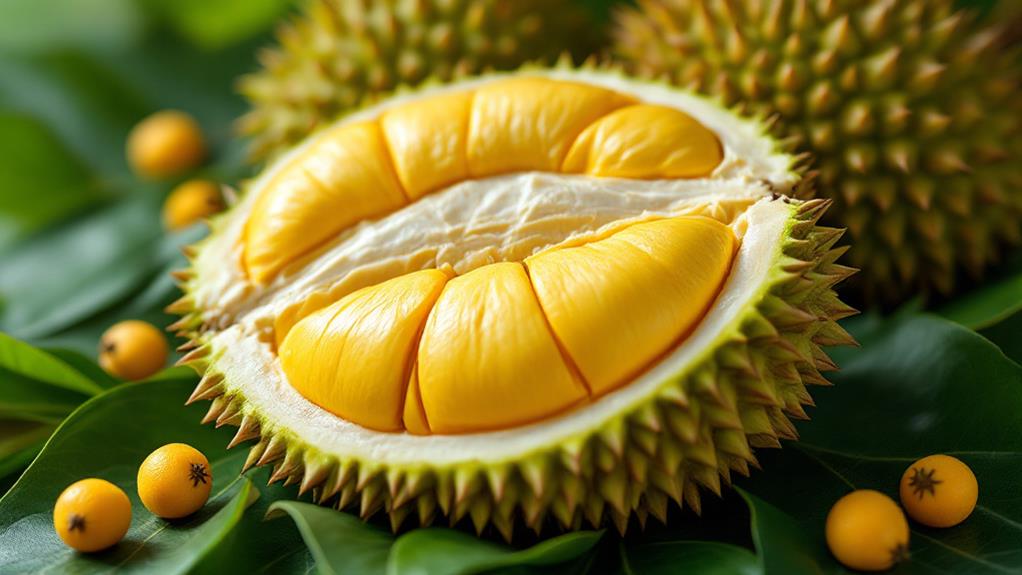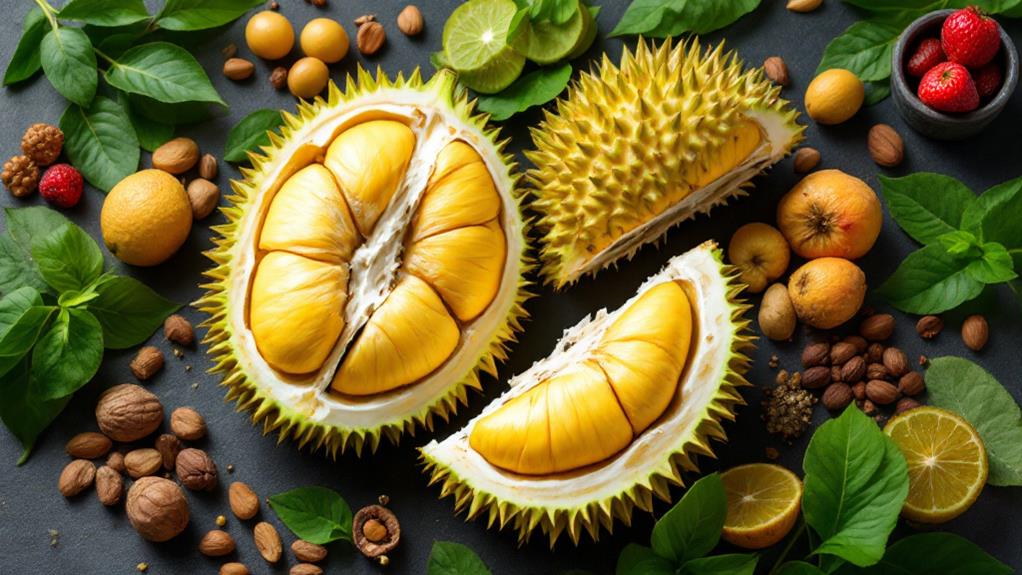A Detailed Guide to Durian: The King of Fruits and Its Health Benefits

You're about to learn about durian, a fruit famed for its bold flavor and health perks. Native to Southeast Asia, durian is calorie-rich, providing energy and crucial nutrients like vitamin C for immune health and potassium for your heart. Its high fiber content aids digestion, while tryptophan can help improve sleep and mood. Enjoy its creamy texture in a variety of dishes, from smoothies to desserts. However, be cautious with its caloric density and sugar content, especially if you're managing your weight or blood sugar. There's much more to uncover about this intriguing fruit's different qualities and uses.
Understanding Durian's Origins
Hidden within the lush landscapes of Southeast Asia, durian claims its roots in Malaysia and Indonesia, enchanting locals and visitors alike. As a fruit native to this region, durian, scientifically known as Durio zibethinus, carries a rich history intertwined with cultural significance and tradition. It's often celebrated as the "King of Fruits," a title earned not only due to its unique taste and texture but also its prominent role in local customs and festivals. Historical mentions of durian date back to Confucius, who described it as delicious, illustrating its long-standing reputation.
Durian's strong odor is notorious, creating a love-it-or-hate-it relationship among those who encounter it. This pungent scent has led to bans in numerous public spaces, yet its allure persists through its perceived health benefits and distinct flavor. In the 19th century, durian made its way to Europe and the United States, gaining recognition as the "most delicious fruit" in French cuisine. Its passage from the jungles of Borneo to international acclaim highlights its importance not just in Southeast Asia, but worldwide, cementing its status as a cultural and culinary icon.
Nutritional Composition
Many are surprised by the nutritional powerhouse that durian truly is. Each 100g serving of this unique fruit packs in approximately 357 calories, marking it as a calorie-dense choice. It's rich in carbohydrates, offering around 66g per 100g, which can provide a quick energy source for those needing a lift. If you're looking for something to aid in healthy digestion, durian's got you covered with its high dietary fiber content of about 5.3g per cup. This fiber not only supports your gut health but also keeps you feeling full longer.
But the benefits don't stop there. Durian is an excellent source of vitamin C, providing 33.6mg per 100g, which covers 44% of the Daily Value. This nutrient is crucial for maintaining a robust immune system and aiding in the absorption of other nutrients. Important minerals like potassium (436mg) and magnesium are also present in durian, contributing considerably to your overall health. Potassium is essential for heart health, while magnesium supports muscle and nerve function. So, when you think of durian, remember it's more than just a fruit; it's packed with health benefits that can improve your well-being.
Health Advantages

When you consider durian's impressive nutritional profile, it's easy to see how it offers numerous health advantages. This fruit is high in calories, providing a quick energy increase, making it perfect for replenishing energy levels after exercise. As a rich source of vitamin C, durian improves your immune health with its antioxidant properties, shielding your body from harmful free radicals.
You'll also find significant amounts of dietary fiber in durian, which aids digestion and supports gut health. By promoting regular bowel movements, it guarantees your digestive system functions smoothly. Another standout benefit of durian is its potassium content. This crucial mineral helps regulate blood pressure, contributing to heart health and reducing the risk of hypertension.
Alongside these benefits, durian contains tryptophan, an amino acid that can improve sleep quality. By facilitating the production of serotonin and melatonin, it helps uplift your mood and supports a restful night's sleep. While durian doesn't directly reduce cholesterol, maintaining heart health through blood pressure regulation and other factors can have a positive impact. This fruit's unique combination of nutrients makes it a valuable supplement to a balanced diet.
Culinary Applications
Beyond its health benefits, durian shines in culinary applications, offering an intriguing blend of flavors and textures. Known for its creamy texture and rich flavor, this tropical fruit can raise a variety of dishes. You can enjoy durian fresh by scooping out its custard-like flesh, which combines notes of cheese, almonds, garlic, and caramel. But its versatility doesn't stop there.
Durian's unique taste improves desserts, making it a popular choice for ice creams, pastries, and cakes. Its ability to complement both sweet and savory dishes makes it a sought-after ingredient for adventurous cooks. In smoothies, durian adds a nutrient-dense lift, packed with vitamins and minerals like vitamin C and dietary fiber. The fruit's edible seeds, when cooked, offer an extra layer of flavor and texture to your meals.
Here are some ways to investigate durian's culinary potential:
- Indulge in desserts: Try durian-flavored ice creams or pastries for a sweet treat.
- Craft flavorful smoothies: Blend durian for a creamy, nutrient-rich drink.
- Experiment with savory dishes: Add durian to curries or stews for a rich flavor.
- Cook the seeds: Boil or roast durian seeds for a unique snack.
Considerations and Precautions

While durian enriches dishes with its bold flavors, it's crucial to be mindful of a few considerations. Durian is calorie-dense, with a small fruit packing around 885 calories. If you're watching your caloric intake, moderation is key to enjoying its health benefits without overindulging. Its high sugar content can also cause blood sugar spikes, so if you're diabetic, limit your consumption to about 2 seeds per day to avoid complications.
In Traditional Chinese Medicine, durian is classified as a "heaty" food. Consuming it in excess, especially in hot climates, can lead to discomfort, including feelings of heat or dehydration. Therefore, moderating your intake can help prevent these issues.
Additionally, mixing durian with alcohol is not advisable. The sulfur-like compounds in durian can interfere with alcohol metabolism, leading to nausea and digestive problems. It's prudent to take precautions and enjoy them separately.
Lastly, be aware of potential allergic reactions. If you're trying durian for the initial time, start with small amounts to gauge your body's response. These steps guarantee that your durian experience is both enjoyable and safe.




